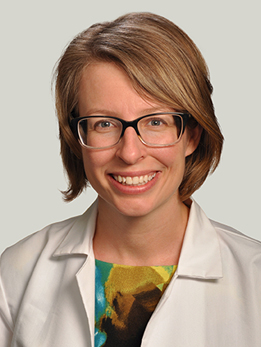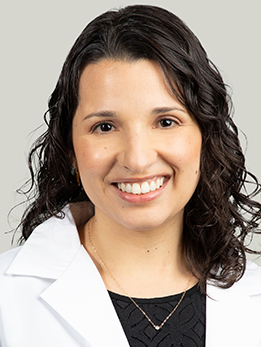
Purpose: To integrate a focus on gender-specific care and women’s health into Internal Medicine or Med-Peds residency training beyond that of the categorical residents
Overview: Since women and gender-diverse patients present through all clinical disciplines, internal medicine residency is a perfect opportunity to develop the cross-discipline skills need to provide evidence-based care to these populations. Through this track, residents will be able to recognize the social, reproductive, and physiologic concerns in the care of women and gender-minorities in both a primary-care and subspecialty context.
This track is a post-match option for residents to join after their intern year. The track is open to all residents regardless of future fellowship plans as these skills can be transferred to any specialty. It can be combined with the LUCENT primary care leadership track or the MERITS medical education track. Participants of the track will gain additional clinical experiences, mentoring, and opportunities for scholarly work in women’s health and gender focused care.
Program Highlights:
- Residents learn to bring the lenses of gender to the care of women and gender minorities throughout all medical specialties
- Additional mentorship to help with career planning and completion of a scholarly project
- Opportunities to learn additional procedures such as IUD and Nexplanon placement and develop confidence in breast and pelvic exam skills
Track Requirements:
- Clinical – 2-week gender-based care elective in the final 2 years of residency. All residents are required to rotate with gynecology, breast clinic, PCG gender-based care clinic, family planning clinic, and adolescent medicine. Additional opportunities with IBD clinic, women’s cardiology, cancer genetics, osteoporosis, trans patient care, and weight management are available
- Scholarship – any type of scholarly project (research, QI, education, etc.) involving women or gender-diverse patients
- Mentorship – meet with the track mentor at least twice a year
- Education – attend the quarterly track small-group didactics, annual grand rounds, and present a gender-based care morning report
Example Gender-Based Care Elective:
| AM | GI IBD clinic | Adolescent med clinic | Breast Surgery Clinic | General gynecology | Trans Patient Clinic |
| PM | PCG gender based care clinic | Complex contraception clinic | Admin | Continuity clinic | Admin |
PCG Gender-Based Care Clinic:
The PCG Gender-Based Care Clinic is an additional service available to patients in the primary care group. Providers can refer patients to the clinic for consultation in managing gender-based care topics. Common clinic referrals include: cervical cancer screening, breast cancer risk assessment and genetic counseling, osteoporosis advance treatment options, trans health, medical monitoring of eating disorders, IUD and Nexplanon placement, management of menstrual irregularities and menopause symptoms. Drs. Rusiecki and Ortiz Worthington staff this clinic. All residents are welcome to rotate in this clinic but priority will be given to those in the track.
Program Leadership: Dr. Jen Rusiecki and Dr. Rebeca Ortiz Worthington
How to apply: Residents should contact Jen Rusiecki (jrusiecki@bsd.uchicago.edu) to meet and discuss their involvement in the track in the spring of their intern year.
Gender-Based Care Morning Reports:
- Disparities in maternal mortality
- Contraception options in women who smoke
- Adventurous women do: counseling patients on HPV infections
- Managing hypertensive emergency in a patient with postpartum preeclampsia
- Diagnosis of PCOS in primary care clinic
- Vasomotor symptom management in menopause
Prior Women’s Health Grand Rounds:
- 2019: Dr. Theresa Rhor-Kirshgraber: Primary Care for Eating Disorder Patients
- 2020: Dr. Tracy Battaglia: In pursuit of equity in breast cancer: A generalist’s perspective
- 2021: Drs. Cuoghi Edens, Sushila Dalal, Alberuni Zamah: Reproductive Health in Medically Complex Women
- 2022: Dr. Diana Green Foster: Projected Health and Economic Consequences of the End of Roe
- 2023: Dr. Eleanor Bila Schwarz: Reproductive Health Care Post-Roe
Track Graduates:
- 2023:
- Geetha Rajagopal: GI Fellowship, University of Cincinnati
- Molly Ryan: GI Fellowship, University of Wisconsin
- Divya Singh: Hospitalist, University of Chicago
- Lola Akingbade: Cardiology Fellowship, University of Chicago
- Brianna Lambert: Primary Care, University of Chicago
- Eric Sun: National Clinic Scholars Program, Yale
- 2022:
- Elena Michaels: Hematology/Oncology Fellowship, Dana-Farber Cancer Institute
- Jannel Liu: Endocrine Fellowship, Vanderbilt
- Amanda Ojugbeli: Hospitalist, Northwell Health
- Aisha Amuda: Hospitalist, Lurie Children’s Hospital
- Molly Perri: Yale Addiction Medicine Fellowship
- 2021:
- Claire Dugan: Primary Care, Assistant Professor of Medicine, NYU Langone Health
- Chelsea Smith: Primary Care Provider Nuvance Health Connecticut
- Juli DaSilva: GI Fellowship, UC San Diego
- Molly Leavitt: MacNeal Hospital Chief Resident, Rheumatology Fellowship at South Florida
- Maya Faison: Rheumatology Fellowship, Duke
- 2020:
- Daniela Anderson: Primary Care Provider, Tapestry Health Chicago FQHC
- Rachel Folz: Primary Care and Women’s Health Provider Rush University Medical Center
- Rachel Karani: Hospitalist Northwestern Medical Group
- Lauren He: Chief Resident at University of Chicago, Rheumatology Fellow at University of Michigan
- 2019:
- Rebeca Ortiz Worthington: University of Pittsburgh Women’s Health Fellowship, now UCMC faculty
- Julia Nath: Rutgers Medical School Addiction Medicine Fellowship, California Pacific Medical Center IM Residency Program: Primary Care Faculty






